Entrepreneurship and Small Business Management Report - Task 1-4
VerifiedAdded on 2021/02/20
|13
|3903
|126
Report
AI Summary
This report delves into the multifaceted world of entrepreneurship and small business management. It begins by classifying various types of entrepreneurial ventures, including small businesses, large businesses, and social enterprises, highlighting their unique characteristics. The report then examines the impact of micro and small businesses on a country's economy, using the UK as a case study, providing data and statistics to illustrate their significance. Furthermore, it explores the importance of small businesses and startups in fostering social growth, emphasizing their role in job creation, tax contribution, and market diversity. The report also differentiates between entrepreneurs and managers, outlining their distinct characteristics, traits, and skills, and analyzes how background and experience can influence entrepreneurial success.

Entrepreneurship and
Small Business
Management
Small Business
Management
Paraphrase This Document
Need a fresh take? Get an instant paraphrase of this document with our AI Paraphraser
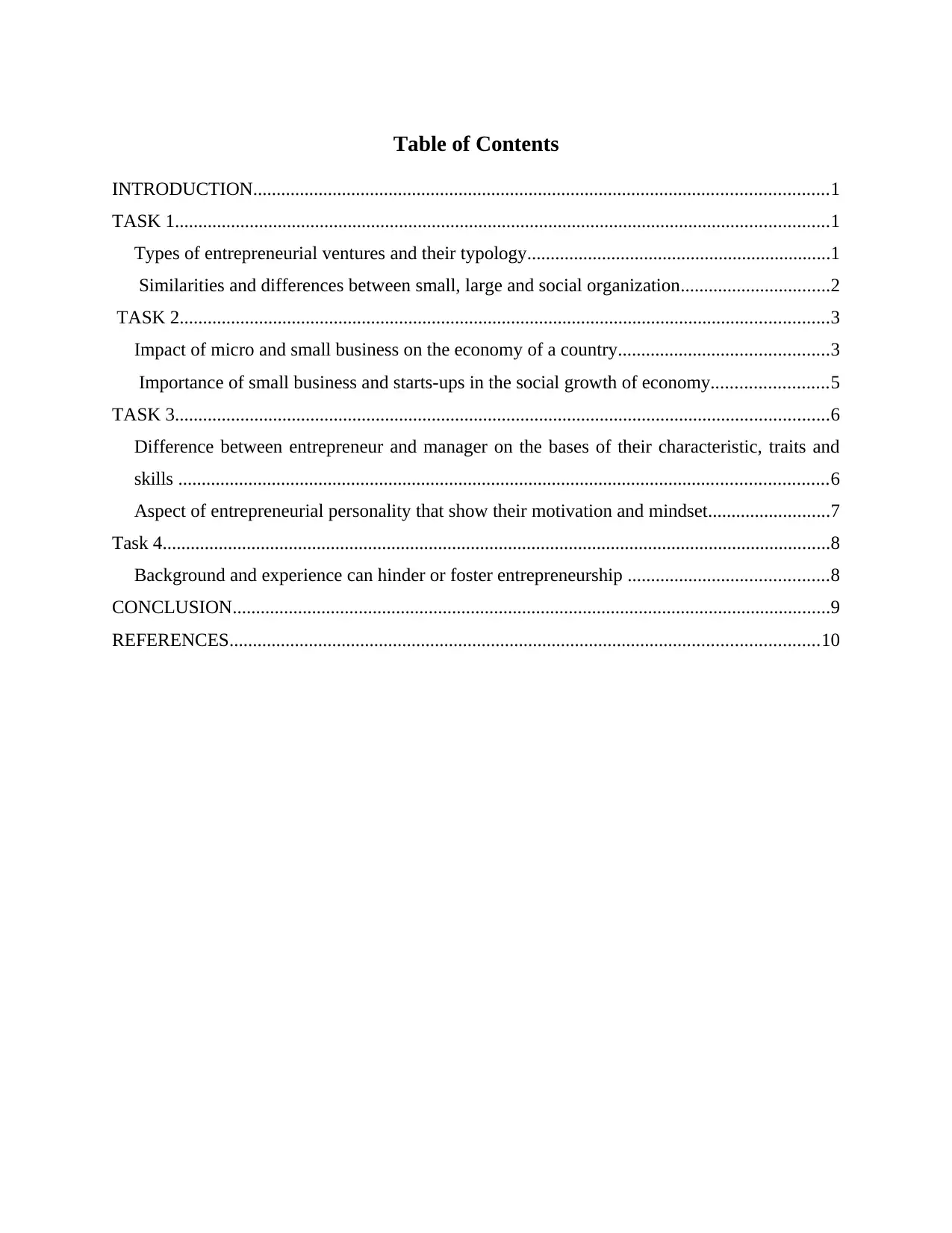
Table of Contents
INTRODUCTION...........................................................................................................................1
TASK 1............................................................................................................................................1
Types of entrepreneurial ventures and their typology.................................................................1
Similarities and differences between small, large and social organization................................2
TASK 2...........................................................................................................................................3
Impact of micro and small business on the economy of a country.............................................3
Importance of small business and starts-ups in the social growth of economy.........................5
TASK 3............................................................................................................................................6
Difference between entrepreneur and manager on the bases of their characteristic, traits and
skills ...........................................................................................................................................6
Aspect of entrepreneurial personality that show their motivation and mindset..........................7
Task 4...............................................................................................................................................8
Background and experience can hinder or foster entrepreneurship ...........................................8
CONCLUSION................................................................................................................................9
REFERENCES..............................................................................................................................10
INTRODUCTION...........................................................................................................................1
TASK 1............................................................................................................................................1
Types of entrepreneurial ventures and their typology.................................................................1
Similarities and differences between small, large and social organization................................2
TASK 2...........................................................................................................................................3
Impact of micro and small business on the economy of a country.............................................3
Importance of small business and starts-ups in the social growth of economy.........................5
TASK 3............................................................................................................................................6
Difference between entrepreneur and manager on the bases of their characteristic, traits and
skills ...........................................................................................................................................6
Aspect of entrepreneurial personality that show their motivation and mindset..........................7
Task 4...............................................................................................................................................8
Background and experience can hinder or foster entrepreneurship ...........................................8
CONCLUSION................................................................................................................................9
REFERENCES..............................................................................................................................10
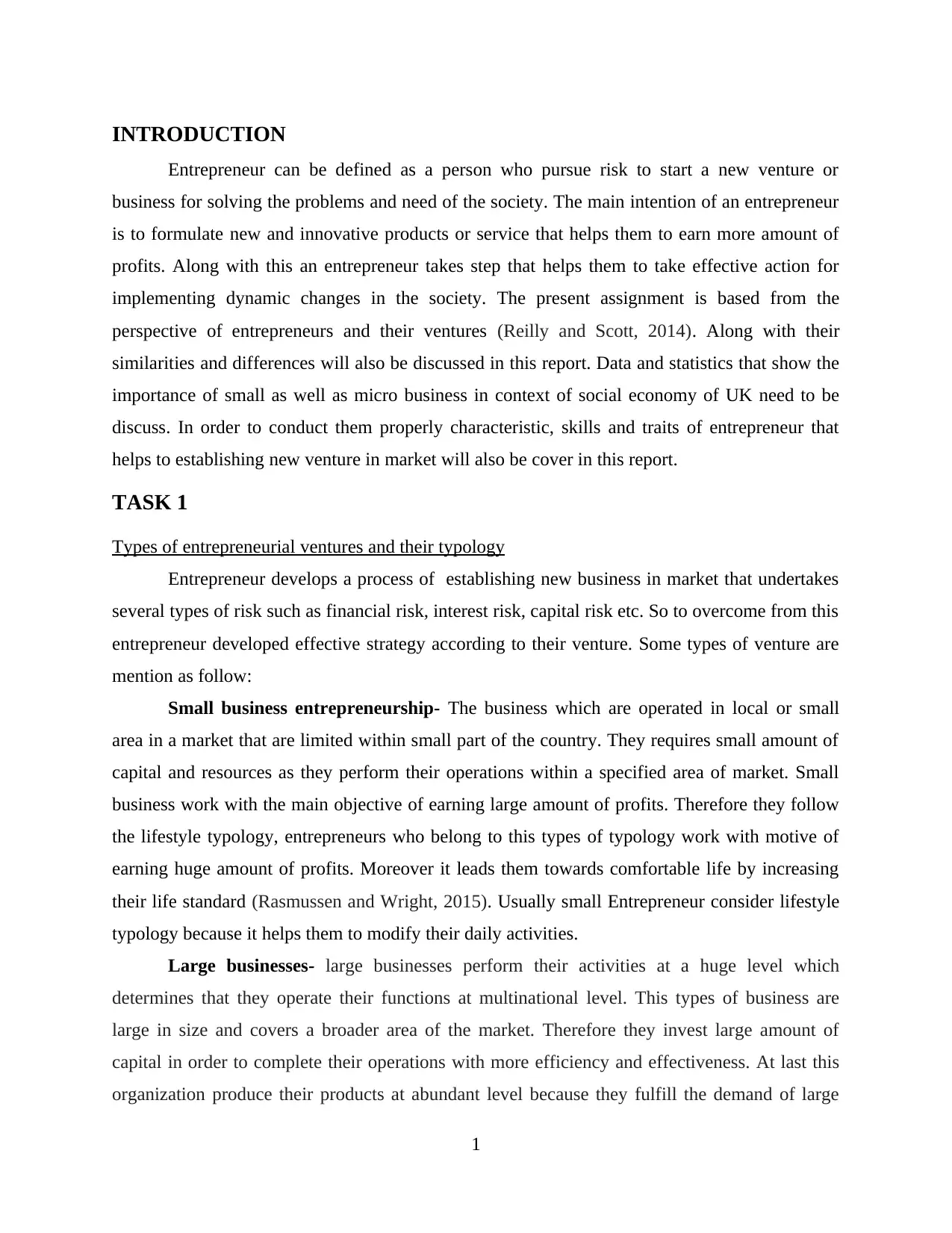
INTRODUCTION
Entrepreneur can be defined as a person who pursue risk to start a new venture or
business for solving the problems and need of the society. The main intention of an entrepreneur
is to formulate new and innovative products or service that helps them to earn more amount of
profits. Along with this an entrepreneur takes step that helps them to take effective action for
implementing dynamic changes in the society. The present assignment is based from the
perspective of entrepreneurs and their ventures (Reilly and Scott, 2014). Along with their
similarities and differences will also be discussed in this report. Data and statistics that show the
importance of small as well as micro business in context of social economy of UK need to be
discuss. In order to conduct them properly characteristic, skills and traits of entrepreneur that
helps to establishing new venture in market will also be cover in this report.
TASK 1
Types of entrepreneurial ventures and their typology
Entrepreneur develops a process of establishing new business in market that undertakes
several types of risk such as financial risk, interest risk, capital risk etc. So to overcome from this
entrepreneur developed effective strategy according to their venture. Some types of venture are
mention as follow:
Small business entrepreneurship- The business which are operated in local or small
area in a market that are limited within small part of the country. They requires small amount of
capital and resources as they perform their operations within a specified area of market. Small
business work with the main objective of earning large amount of profits. Therefore they follow
the lifestyle typology, entrepreneurs who belong to this types of typology work with motive of
earning huge amount of profits. Moreover it leads them towards comfortable life by increasing
their life standard (Rasmussen and Wright, 2015). Usually small Entrepreneur consider lifestyle
typology because it helps them to modify their daily activities.
Large businesses- large businesses perform their activities at a huge level which
determines that they operate their functions at multinational level. This types of business are
large in size and covers a broader area of the market. Therefore they invest large amount of
capital in order to complete their operations with more efficiency and effectiveness. At last this
organization produce their products at abundant level because they fulfill the demand of large
1
Entrepreneur can be defined as a person who pursue risk to start a new venture or
business for solving the problems and need of the society. The main intention of an entrepreneur
is to formulate new and innovative products or service that helps them to earn more amount of
profits. Along with this an entrepreneur takes step that helps them to take effective action for
implementing dynamic changes in the society. The present assignment is based from the
perspective of entrepreneurs and their ventures (Reilly and Scott, 2014). Along with their
similarities and differences will also be discussed in this report. Data and statistics that show the
importance of small as well as micro business in context of social economy of UK need to be
discuss. In order to conduct them properly characteristic, skills and traits of entrepreneur that
helps to establishing new venture in market will also be cover in this report.
TASK 1
Types of entrepreneurial ventures and their typology
Entrepreneur develops a process of establishing new business in market that undertakes
several types of risk such as financial risk, interest risk, capital risk etc. So to overcome from this
entrepreneur developed effective strategy according to their venture. Some types of venture are
mention as follow:
Small business entrepreneurship- The business which are operated in local or small
area in a market that are limited within small part of the country. They requires small amount of
capital and resources as they perform their operations within a specified area of market. Small
business work with the main objective of earning large amount of profits. Therefore they follow
the lifestyle typology, entrepreneurs who belong to this types of typology work with motive of
earning huge amount of profits. Moreover it leads them towards comfortable life by increasing
their life standard (Rasmussen and Wright, 2015). Usually small Entrepreneur consider lifestyle
typology because it helps them to modify their daily activities.
Large businesses- large businesses perform their activities at a huge level which
determines that they operate their functions at multinational level. This types of business are
large in size and covers a broader area of the market. Therefore they invest large amount of
capital in order to complete their operations with more efficiency and effectiveness. At last this
organization produce their products at abundant level because they fulfill the demand of large
1
⊘ This is a preview!⊘
Do you want full access?
Subscribe today to unlock all pages.

Trusted by 1+ million students worldwide
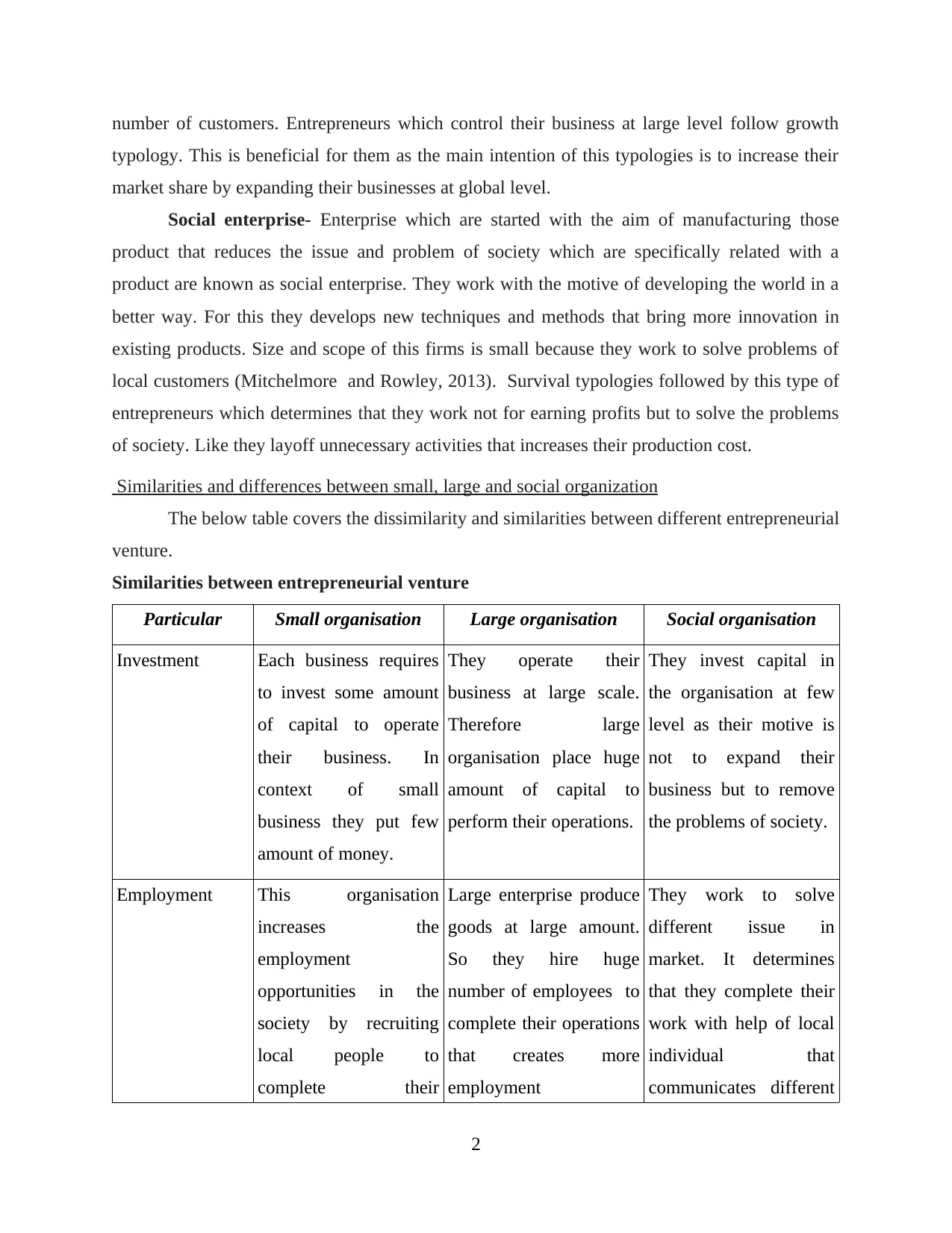
number of customers. Entrepreneurs which control their business at large level follow growth
typology. This is beneficial for them as the main intention of this typologies is to increase their
market share by expanding their businesses at global level.
Social enterprise- Enterprise which are started with the aim of manufacturing those
product that reduces the issue and problem of society which are specifically related with a
product are known as social enterprise. They work with the motive of developing the world in a
better way. For this they develops new techniques and methods that bring more innovation in
existing products. Size and scope of this firms is small because they work to solve problems of
local customers (Mitchelmore and Rowley, 2013). Survival typologies followed by this type of
entrepreneurs which determines that they work not for earning profits but to solve the problems
of society. Like they layoff unnecessary activities that increases their production cost.
Similarities and differences between small, large and social organization
The below table covers the dissimilarity and similarities between different entrepreneurial
venture.
Similarities between entrepreneurial venture
Particular Small organisation Large organisation Social organisation
Investment Each business requires
to invest some amount
of capital to operate
their business. In
context of small
business they put few
amount of money.
They operate their
business at large scale.
Therefore large
organisation place huge
amount of capital to
perform their operations.
They invest capital in
the organisation at few
level as their motive is
not to expand their
business but to remove
the problems of society.
Employment This organisation
increases the
employment
opportunities in the
society by recruiting
local people to
complete their
Large enterprise produce
goods at large amount.
So they hire huge
number of employees to
complete their operations
that creates more
employment
They work to solve
different issue in
market. It determines
that they complete their
work with help of local
individual that
communicates different
2
typology. This is beneficial for them as the main intention of this typologies is to increase their
market share by expanding their businesses at global level.
Social enterprise- Enterprise which are started with the aim of manufacturing those
product that reduces the issue and problem of society which are specifically related with a
product are known as social enterprise. They work with the motive of developing the world in a
better way. For this they develops new techniques and methods that bring more innovation in
existing products. Size and scope of this firms is small because they work to solve problems of
local customers (Mitchelmore and Rowley, 2013). Survival typologies followed by this type of
entrepreneurs which determines that they work not for earning profits but to solve the problems
of society. Like they layoff unnecessary activities that increases their production cost.
Similarities and differences between small, large and social organization
The below table covers the dissimilarity and similarities between different entrepreneurial
venture.
Similarities between entrepreneurial venture
Particular Small organisation Large organisation Social organisation
Investment Each business requires
to invest some amount
of capital to operate
their business. In
context of small
business they put few
amount of money.
They operate their
business at large scale.
Therefore large
organisation place huge
amount of capital to
perform their operations.
They invest capital in
the organisation at few
level as their motive is
not to expand their
business but to remove
the problems of society.
Employment This organisation
increases the
employment
opportunities in the
society by recruiting
local people to
complete their
Large enterprise produce
goods at large amount.
So they hire huge
number of employees to
complete their operations
that creates more
employment
They work to solve
different issue in
market. It determines
that they complete their
work with help of local
individual that
communicates different
2
Paraphrase This Document
Need a fresh take? Get an instant paraphrase of this document with our AI Paraphraser
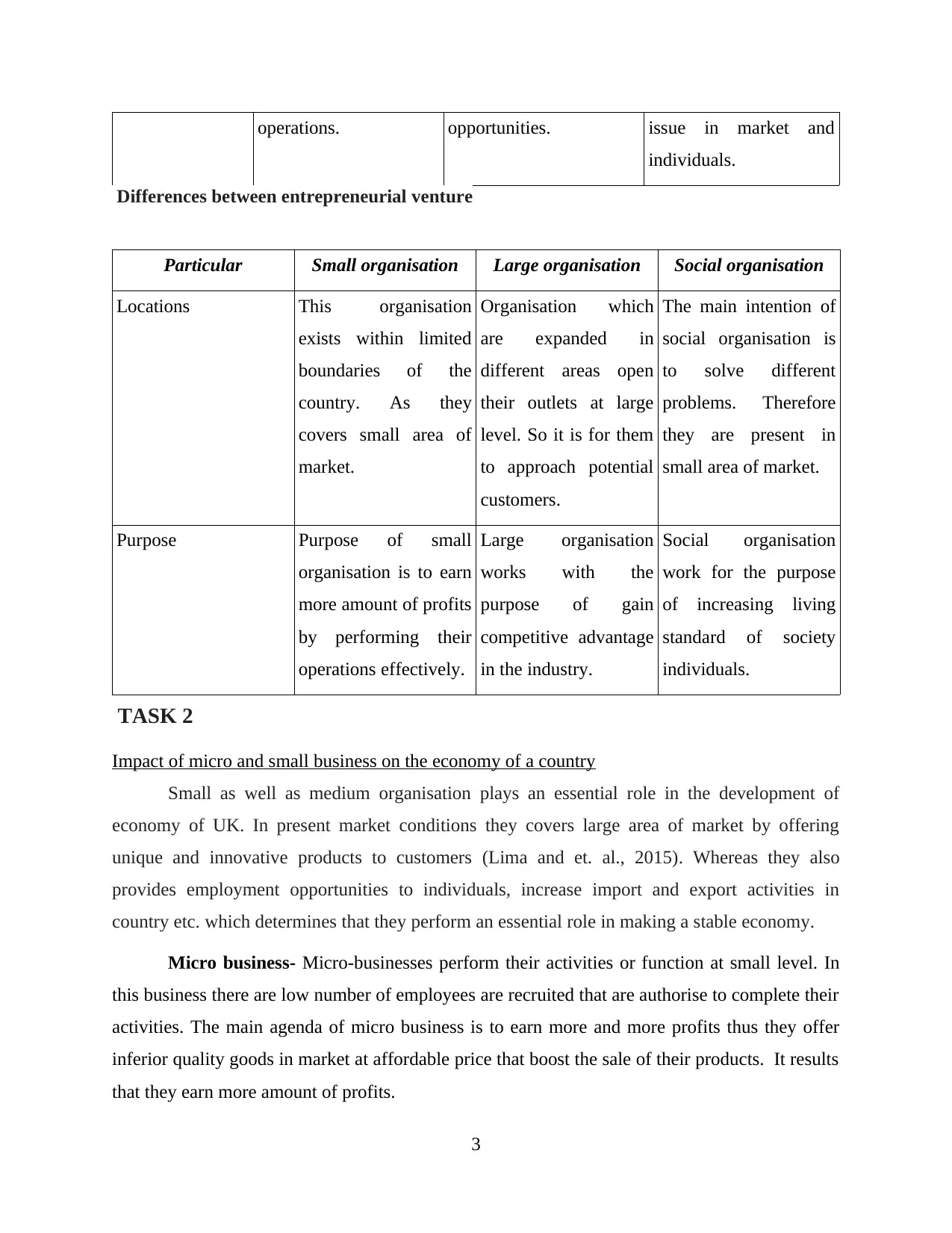
operations. opportunities. issue in market and
individuals.
Differences between entrepreneurial venture
Particular Small organisation Large organisation Social organisation
Locations This organisation
exists within limited
boundaries of the
country. As they
covers small area of
market.
Organisation which
are expanded in
different areas open
their outlets at large
level. So it is for them
to approach potential
customers.
The main intention of
social organisation is
to solve different
problems. Therefore
they are present in
small area of market.
Purpose Purpose of small
organisation is to earn
more amount of profits
by performing their
operations effectively.
Large organisation
works with the
purpose of gain
competitive advantage
in the industry.
Social organisation
work for the purpose
of increasing living
standard of society
individuals.
TASK 2
Impact of micro and small business on the economy of a country
Small as well as medium organisation plays an essential role in the development of
economy of UK. In present market conditions they covers large area of market by offering
unique and innovative products to customers (Lima and et. al., 2015). Whereas they also
provides employment opportunities to individuals, increase import and export activities in
country etc. which determines that they perform an essential role in making a stable economy.
Micro business- Micro-businesses perform their activities or function at small level. In
this business there are low number of employees are recruited that are authorise to complete their
activities. The main agenda of micro business is to earn more and more profits thus they offer
inferior quality goods in market at affordable price that boost the sale of their products. It results
that they earn more amount of profits.
3
individuals.
Differences between entrepreneurial venture
Particular Small organisation Large organisation Social organisation
Locations This organisation
exists within limited
boundaries of the
country. As they
covers small area of
market.
Organisation which
are expanded in
different areas open
their outlets at large
level. So it is for them
to approach potential
customers.
The main intention of
social organisation is
to solve different
problems. Therefore
they are present in
small area of market.
Purpose Purpose of small
organisation is to earn
more amount of profits
by performing their
operations effectively.
Large organisation
works with the
purpose of gain
competitive advantage
in the industry.
Social organisation
work for the purpose
of increasing living
standard of society
individuals.
TASK 2
Impact of micro and small business on the economy of a country
Small as well as medium organisation plays an essential role in the development of
economy of UK. In present market conditions they covers large area of market by offering
unique and innovative products to customers (Lima and et. al., 2015). Whereas they also
provides employment opportunities to individuals, increase import and export activities in
country etc. which determines that they perform an essential role in making a stable economy.
Micro business- Micro-businesses perform their activities or function at small level. In
this business there are low number of employees are recruited that are authorise to complete their
activities. The main agenda of micro business is to earn more and more profits thus they offer
inferior quality goods in market at affordable price that boost the sale of their products. It results
that they earn more amount of profits.
3
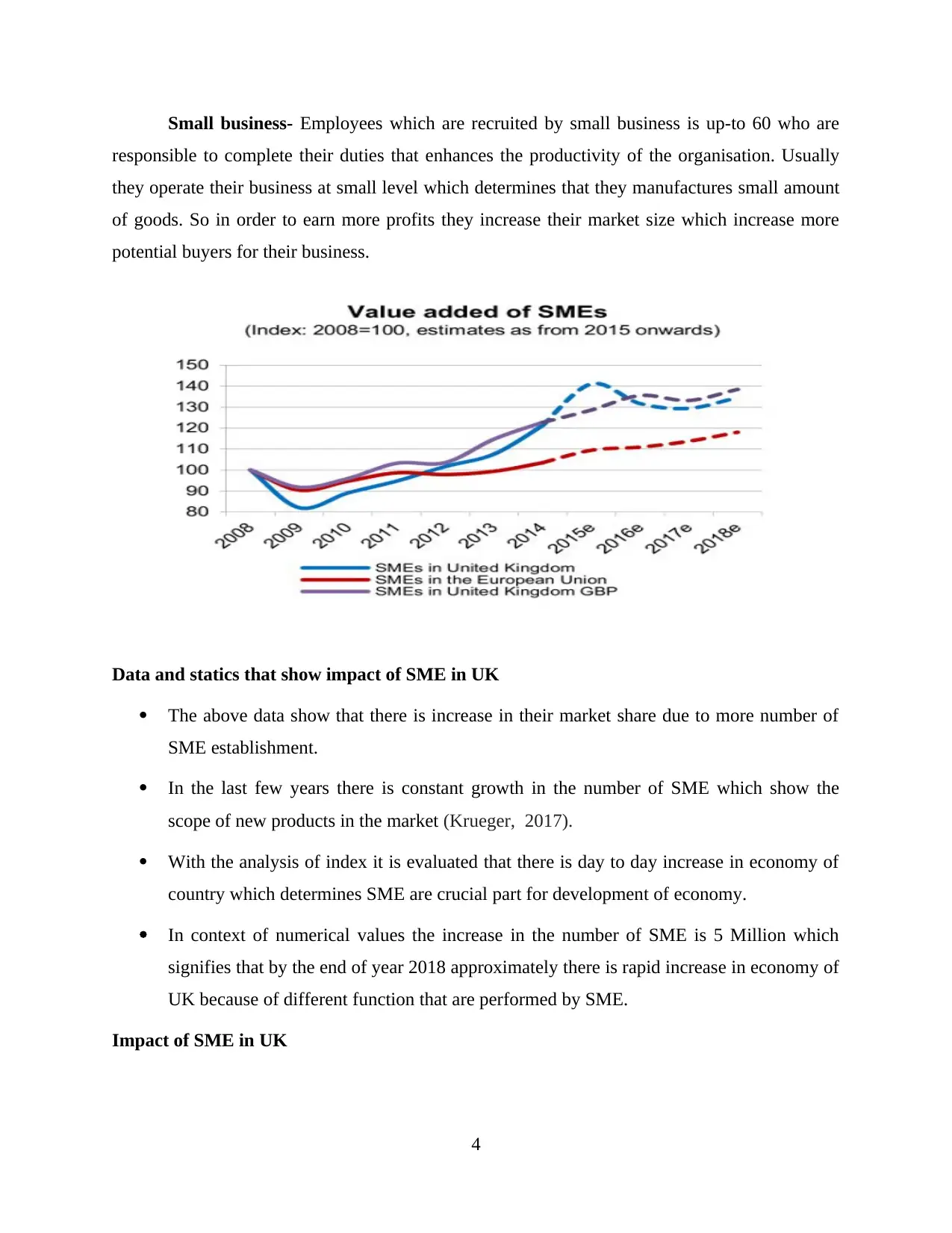
Small business- Employees which are recruited by small business is up-to 60 who are
responsible to complete their duties that enhances the productivity of the organisation. Usually
they operate their business at small level which determines that they manufactures small amount
of goods. So in order to earn more profits they increase their market size which increase more
potential buyers for their business.
Data and statics that show impact of SME in UK
The above data show that there is increase in their market share due to more number of
SME establishment.
In the last few years there is constant growth in the number of SME which show the
scope of new products in the market (Krueger, 2017).
With the analysis of index it is evaluated that there is day to day increase in economy of
country which determines SME are crucial part for development of economy.
In context of numerical values the increase in the number of SME is 5 Million which
signifies that by the end of year 2018 approximately there is rapid increase in economy of
UK because of different function that are performed by SME.
Impact of SME in UK
4
responsible to complete their duties that enhances the productivity of the organisation. Usually
they operate their business at small level which determines that they manufactures small amount
of goods. So in order to earn more profits they increase their market size which increase more
potential buyers for their business.
Data and statics that show impact of SME in UK
The above data show that there is increase in their market share due to more number of
SME establishment.
In the last few years there is constant growth in the number of SME which show the
scope of new products in the market (Krueger, 2017).
With the analysis of index it is evaluated that there is day to day increase in economy of
country which determines SME are crucial part for development of economy.
In context of numerical values the increase in the number of SME is 5 Million which
signifies that by the end of year 2018 approximately there is rapid increase in economy of
UK because of different function that are performed by SME.
Impact of SME in UK
4
⊘ This is a preview!⊘
Do you want full access?
Subscribe today to unlock all pages.

Trusted by 1+ million students worldwide
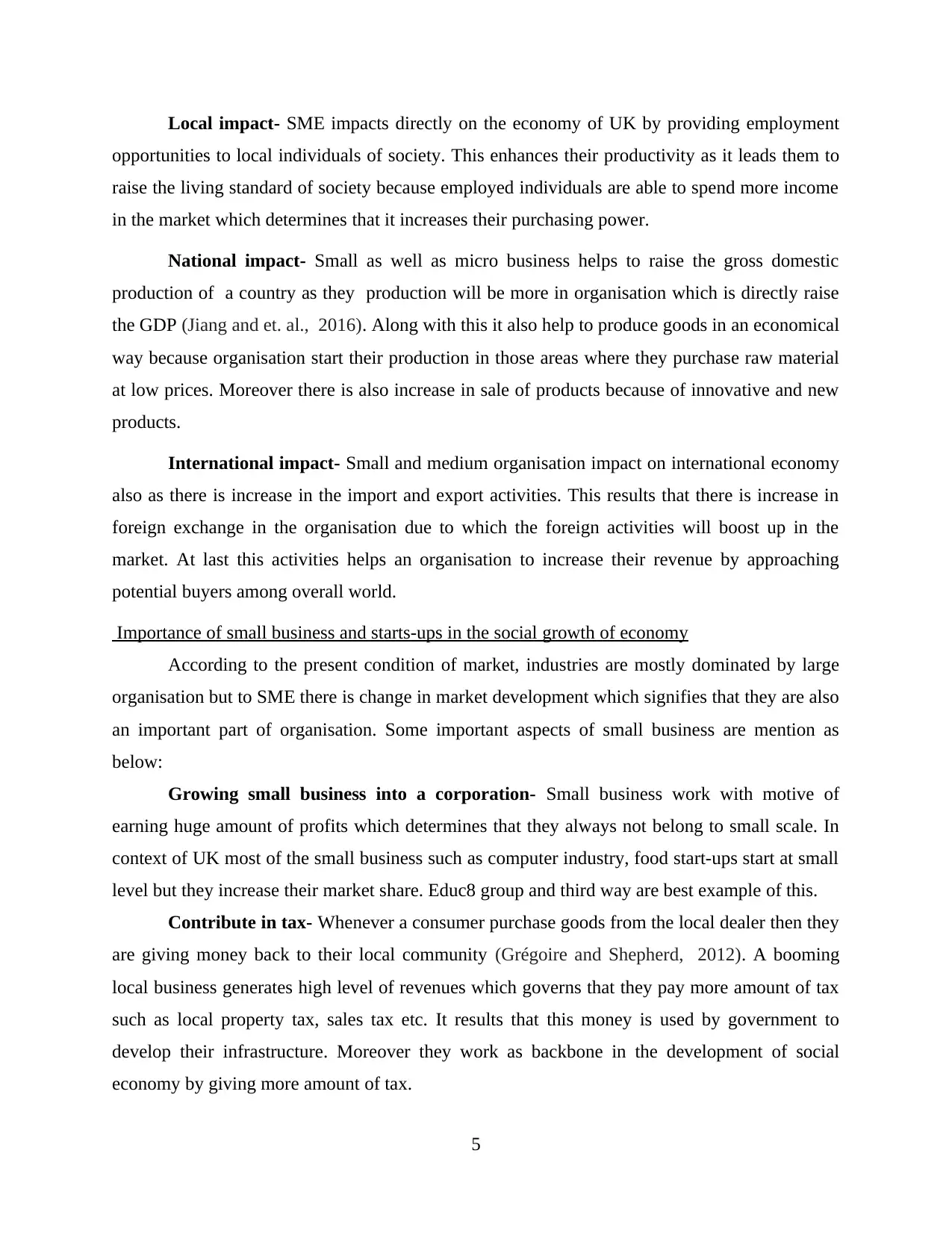
Local impact- SME impacts directly on the economy of UK by providing employment
opportunities to local individuals of society. This enhances their productivity as it leads them to
raise the living standard of society because employed individuals are able to spend more income
in the market which determines that it increases their purchasing power.
National impact- Small as well as micro business helps to raise the gross domestic
production of a country as they production will be more in organisation which is directly raise
the GDP (Jiang and et. al., 2016). Along with this it also help to produce goods in an economical
way because organisation start their production in those areas where they purchase raw material
at low prices. Moreover there is also increase in sale of products because of innovative and new
products.
International impact- Small and medium organisation impact on international economy
also as there is increase in the import and export activities. This results that there is increase in
foreign exchange in the organisation due to which the foreign activities will boost up in the
market. At last this activities helps an organisation to increase their revenue by approaching
potential buyers among overall world.
Importance of small business and starts-ups in the social growth of economy
According to the present condition of market, industries are mostly dominated by large
organisation but to SME there is change in market development which signifies that they are also
an important part of organisation. Some important aspects of small business are mention as
below:
Growing small business into a corporation- Small business work with motive of
earning huge amount of profits which determines that they always not belong to small scale. In
context of UK most of the small business such as computer industry, food start-ups start at small
level but they increase their market share. Educ8 group and third way are best example of this.
Contribute in tax- Whenever a consumer purchase goods from the local dealer then they
are giving money back to their local community (Grégoire and Shepherd, 2012). A booming
local business generates high level of revenues which governs that they pay more amount of tax
such as local property tax, sales tax etc. It results that this money is used by government to
develop their infrastructure. Moreover they work as backbone in the development of social
economy by giving more amount of tax.
5
opportunities to local individuals of society. This enhances their productivity as it leads them to
raise the living standard of society because employed individuals are able to spend more income
in the market which determines that it increases their purchasing power.
National impact- Small as well as micro business helps to raise the gross domestic
production of a country as they production will be more in organisation which is directly raise
the GDP (Jiang and et. al., 2016). Along with this it also help to produce goods in an economical
way because organisation start their production in those areas where they purchase raw material
at low prices. Moreover there is also increase in sale of products because of innovative and new
products.
International impact- Small and medium organisation impact on international economy
also as there is increase in the import and export activities. This results that there is increase in
foreign exchange in the organisation due to which the foreign activities will boost up in the
market. At last this activities helps an organisation to increase their revenue by approaching
potential buyers among overall world.
Importance of small business and starts-ups in the social growth of economy
According to the present condition of market, industries are mostly dominated by large
organisation but to SME there is change in market development which signifies that they are also
an important part of organisation. Some important aspects of small business are mention as
below:
Growing small business into a corporation- Small business work with motive of
earning huge amount of profits which determines that they always not belong to small scale. In
context of UK most of the small business such as computer industry, food start-ups start at small
level but they increase their market share. Educ8 group and third way are best example of this.
Contribute in tax- Whenever a consumer purchase goods from the local dealer then they
are giving money back to their local community (Grégoire and Shepherd, 2012). A booming
local business generates high level of revenues which governs that they pay more amount of tax
such as local property tax, sales tax etc. It results that this money is used by government to
develop their infrastructure. Moreover they work as backbone in the development of social
economy by giving more amount of tax.
5
Paraphrase This Document
Need a fresh take? Get an instant paraphrase of this document with our AI Paraphraser
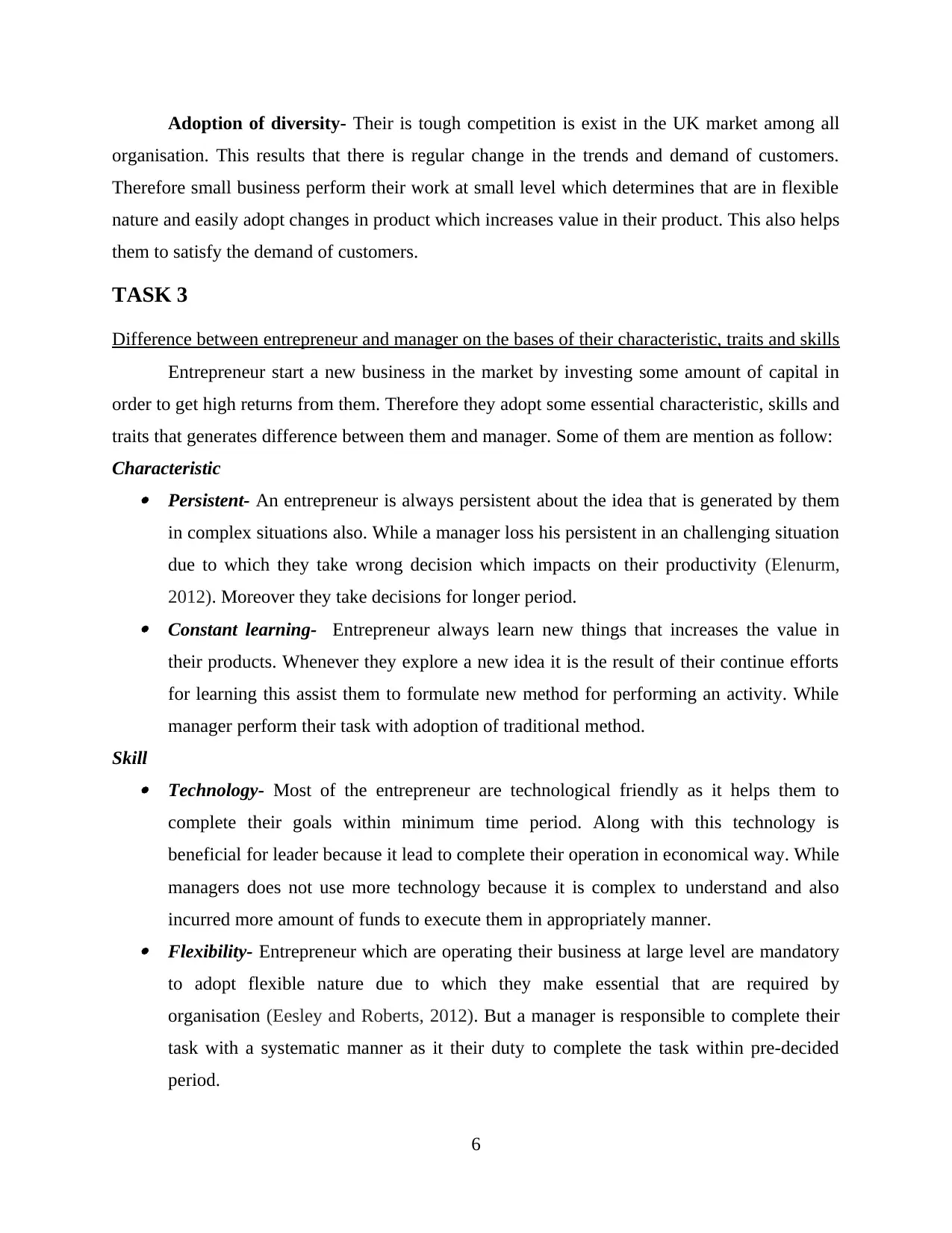
Adoption of diversity- Their is tough competition is exist in the UK market among all
organisation. This results that there is regular change in the trends and demand of customers.
Therefore small business perform their work at small level which determines that are in flexible
nature and easily adopt changes in product which increases value in their product. This also helps
them to satisfy the demand of customers.
TASK 3
Difference between entrepreneur and manager on the bases of their characteristic, traits and skills
Entrepreneur start a new business in the market by investing some amount of capital in
order to get high returns from them. Therefore they adopt some essential characteristic, skills and
traits that generates difference between them and manager. Some of them are mention as follow:
Characteristic Persistent- An entrepreneur is always persistent about the idea that is generated by them
in complex situations also. While a manager loss his persistent in an challenging situation
due to which they take wrong decision which impacts on their productivity (Elenurm,
2012). Moreover they take decisions for longer period. Constant learning- Entrepreneur always learn new things that increases the value in
their products. Whenever they explore a new idea it is the result of their continue efforts
for learning this assist them to formulate new method for performing an activity. While
manager perform their task with adoption of traditional method.
Skill Technology- Most of the entrepreneur are technological friendly as it helps them to
complete their goals within minimum time period. Along with this technology is
beneficial for leader because it lead to complete their operation in economical way. While
managers does not use more technology because it is complex to understand and also
incurred more amount of funds to execute them in appropriately manner. Flexibility- Entrepreneur which are operating their business at large level are mandatory
to adopt flexible nature due to which they make essential that are required by
organisation (Eesley and Roberts, 2012). But a manager is responsible to complete their
task with a systematic manner as it their duty to complete the task within pre-decided
period.
6
organisation. This results that there is regular change in the trends and demand of customers.
Therefore small business perform their work at small level which determines that are in flexible
nature and easily adopt changes in product which increases value in their product. This also helps
them to satisfy the demand of customers.
TASK 3
Difference between entrepreneur and manager on the bases of their characteristic, traits and skills
Entrepreneur start a new business in the market by investing some amount of capital in
order to get high returns from them. Therefore they adopt some essential characteristic, skills and
traits that generates difference between them and manager. Some of them are mention as follow:
Characteristic Persistent- An entrepreneur is always persistent about the idea that is generated by them
in complex situations also. While a manager loss his persistent in an challenging situation
due to which they take wrong decision which impacts on their productivity (Elenurm,
2012). Moreover they take decisions for longer period. Constant learning- Entrepreneur always learn new things that increases the value in
their products. Whenever they explore a new idea it is the result of their continue efforts
for learning this assist them to formulate new method for performing an activity. While
manager perform their task with adoption of traditional method.
Skill Technology- Most of the entrepreneur are technological friendly as it helps them to
complete their goals within minimum time period. Along with this technology is
beneficial for leader because it lead to complete their operation in economical way. While
managers does not use more technology because it is complex to understand and also
incurred more amount of funds to execute them in appropriately manner. Flexibility- Entrepreneur which are operating their business at large level are mandatory
to adopt flexible nature due to which they make essential that are required by
organisation (Eesley and Roberts, 2012). But a manager is responsible to complete their
task with a systematic manner as it their duty to complete the task within pre-decided
period.
6
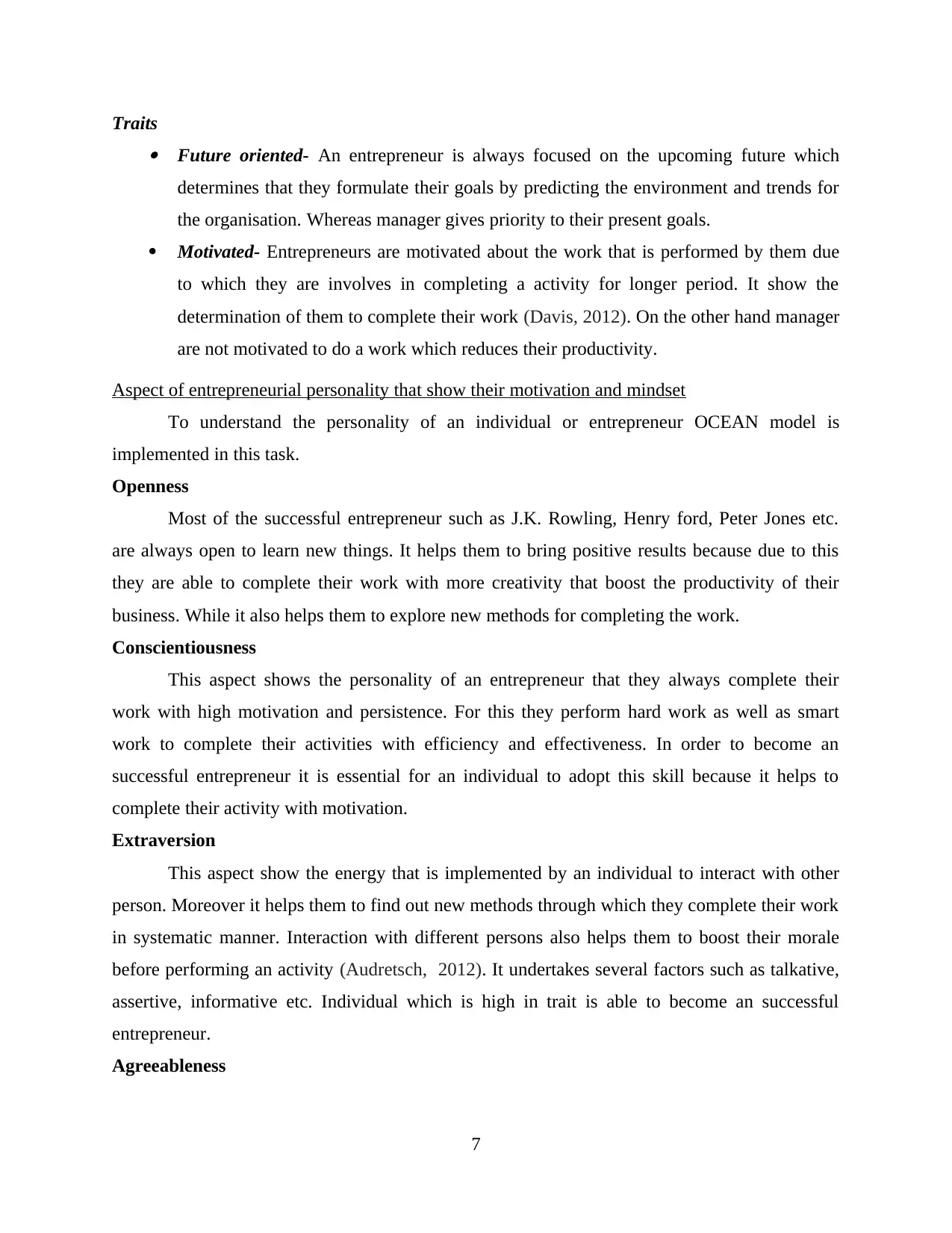
Traits Future oriented- An entrepreneur is always focused on the upcoming future which
determines that they formulate their goals by predicting the environment and trends for
the organisation. Whereas manager gives priority to their present goals.
Motivated- Entrepreneurs are motivated about the work that is performed by them due
to which they are involves in completing a activity for longer period. It show the
determination of them to complete their work (Davis, 2012). On the other hand manager
are not motivated to do a work which reduces their productivity.
Aspect of entrepreneurial personality that show their motivation and mindset
To understand the personality of an individual or entrepreneur OCEAN model is
implemented in this task.
Openness
Most of the successful entrepreneur such as J.K. Rowling, Henry ford, Peter Jones etc.
are always open to learn new things. It helps them to bring positive results because due to this
they are able to complete their work with more creativity that boost the productivity of their
business. While it also helps them to explore new methods for completing the work.
Conscientiousness
This aspect shows the personality of an entrepreneur that they always complete their
work with high motivation and persistence. For this they perform hard work as well as smart
work to complete their activities with efficiency and effectiveness. In order to become an
successful entrepreneur it is essential for an individual to adopt this skill because it helps to
complete their activity with motivation.
Extraversion
This aspect show the energy that is implemented by an individual to interact with other
person. Moreover it helps them to find out new methods through which they complete their work
in systematic manner. Interaction with different persons also helps them to boost their morale
before performing an activity (Audretsch, 2012). It undertakes several factors such as talkative,
assertive, informative etc. Individual which is high in trait is able to become an successful
entrepreneur.
Agreeableness
7
determines that they formulate their goals by predicting the environment and trends for
the organisation. Whereas manager gives priority to their present goals.
Motivated- Entrepreneurs are motivated about the work that is performed by them due
to which they are involves in completing a activity for longer period. It show the
determination of them to complete their work (Davis, 2012). On the other hand manager
are not motivated to do a work which reduces their productivity.
Aspect of entrepreneurial personality that show their motivation and mindset
To understand the personality of an individual or entrepreneur OCEAN model is
implemented in this task.
Openness
Most of the successful entrepreneur such as J.K. Rowling, Henry ford, Peter Jones etc.
are always open to learn new things. It helps them to bring positive results because due to this
they are able to complete their work with more creativity that boost the productivity of their
business. While it also helps them to explore new methods for completing the work.
Conscientiousness
This aspect shows the personality of an entrepreneur that they always complete their
work with high motivation and persistence. For this they perform hard work as well as smart
work to complete their activities with efficiency and effectiveness. In order to become an
successful entrepreneur it is essential for an individual to adopt this skill because it helps to
complete their activity with motivation.
Extraversion
This aspect show the energy that is implemented by an individual to interact with other
person. Moreover it helps them to find out new methods through which they complete their work
in systematic manner. Interaction with different persons also helps them to boost their morale
before performing an activity (Audretsch, 2012). It undertakes several factors such as talkative,
assertive, informative etc. Individual which is high in trait is able to become an successful
entrepreneur.
Agreeableness
7
⊘ This is a preview!⊘
Do you want full access?
Subscribe today to unlock all pages.

Trusted by 1+ million students worldwide
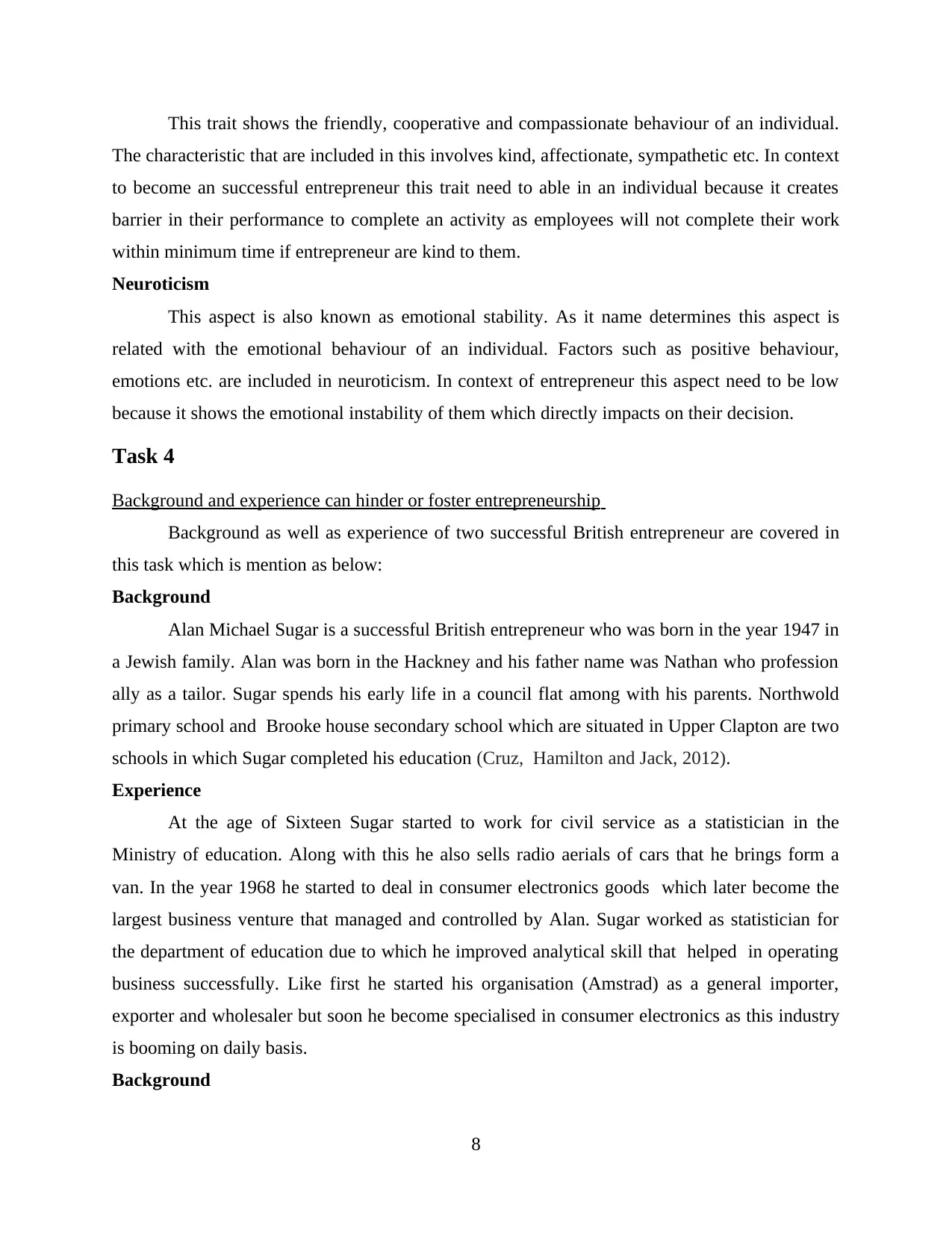
This trait shows the friendly, cooperative and compassionate behaviour of an individual.
The characteristic that are included in this involves kind, affectionate, sympathetic etc. In context
to become an successful entrepreneur this trait need to able in an individual because it creates
barrier in their performance to complete an activity as employees will not complete their work
within minimum time if entrepreneur are kind to them.
Neuroticism
This aspect is also known as emotional stability. As it name determines this aspect is
related with the emotional behaviour of an individual. Factors such as positive behaviour,
emotions etc. are included in neuroticism. In context of entrepreneur this aspect need to be low
because it shows the emotional instability of them which directly impacts on their decision.
Task 4
Background and experience can hinder or foster entrepreneurship
Background as well as experience of two successful British entrepreneur are covered in
this task which is mention as below:
Background
Alan Michael Sugar is a successful British entrepreneur who was born in the year 1947 in
a Jewish family. Alan was born in the Hackney and his father name was Nathan who profession
ally as a tailor. Sugar spends his early life in a council flat among with his parents. Northwold
primary school and Brooke house secondary school which are situated in Upper Clapton are two
schools in which Sugar completed his education (Cruz, Hamilton and Jack, 2012).
Experience
At the age of Sixteen Sugar started to work for civil service as a statistician in the
Ministry of education. Along with this he also sells radio aerials of cars that he brings form a
van. In the year 1968 he started to deal in consumer electronics goods which later become the
largest business venture that managed and controlled by Alan. Sugar worked as statistician for
the department of education due to which he improved analytical skill that helped in operating
business successfully. Like first he started his organisation (Amstrad) as a general importer,
exporter and wholesaler but soon he become specialised in consumer electronics as this industry
is booming on daily basis.
Background
8
The characteristic that are included in this involves kind, affectionate, sympathetic etc. In context
to become an successful entrepreneur this trait need to able in an individual because it creates
barrier in their performance to complete an activity as employees will not complete their work
within minimum time if entrepreneur are kind to them.
Neuroticism
This aspect is also known as emotional stability. As it name determines this aspect is
related with the emotional behaviour of an individual. Factors such as positive behaviour,
emotions etc. are included in neuroticism. In context of entrepreneur this aspect need to be low
because it shows the emotional instability of them which directly impacts on their decision.
Task 4
Background and experience can hinder or foster entrepreneurship
Background as well as experience of two successful British entrepreneur are covered in
this task which is mention as below:
Background
Alan Michael Sugar is a successful British entrepreneur who was born in the year 1947 in
a Jewish family. Alan was born in the Hackney and his father name was Nathan who profession
ally as a tailor. Sugar spends his early life in a council flat among with his parents. Northwold
primary school and Brooke house secondary school which are situated in Upper Clapton are two
schools in which Sugar completed his education (Cruz, Hamilton and Jack, 2012).
Experience
At the age of Sixteen Sugar started to work for civil service as a statistician in the
Ministry of education. Along with this he also sells radio aerials of cars that he brings form a
van. In the year 1968 he started to deal in consumer electronics goods which later become the
largest business venture that managed and controlled by Alan. Sugar worked as statistician for
the department of education due to which he improved analytical skill that helped in operating
business successfully. Like first he started his organisation (Amstrad) as a general importer,
exporter and wholesaler but soon he become specialised in consumer electronics as this industry
is booming on daily basis.
Background
8
Paraphrase This Document
Need a fresh take? Get an instant paraphrase of this document with our AI Paraphraser
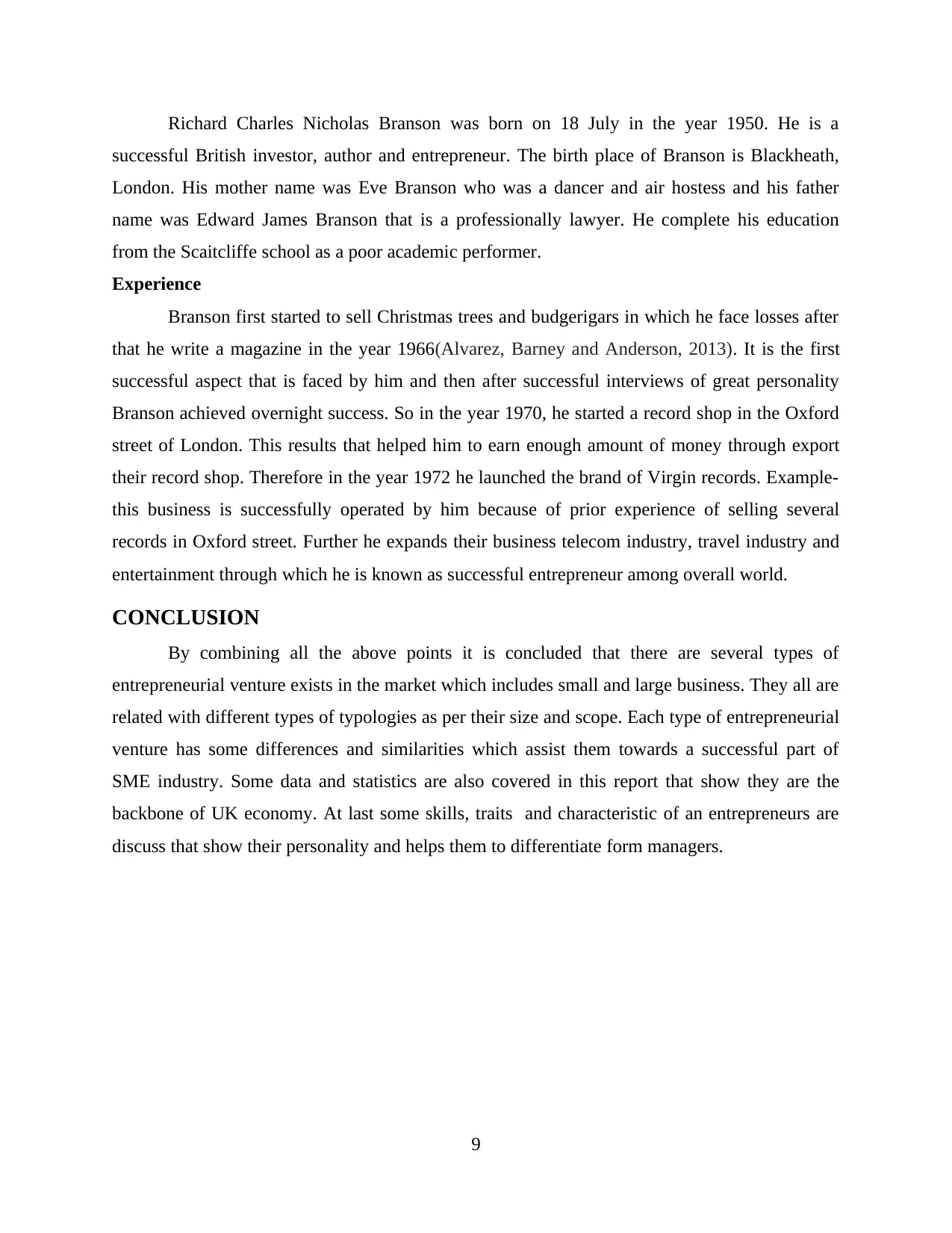
Richard Charles Nicholas Branson was born on 18 July in the year 1950. He is a
successful British investor, author and entrepreneur. The birth place of Branson is Blackheath,
London. His mother name was Eve Branson who was a dancer and air hostess and his father
name was Edward James Branson that is a professionally lawyer. He complete his education
from the Scaitcliffe school as a poor academic performer.
Experience
Branson first started to sell Christmas trees and budgerigars in which he face losses after
that he write a magazine in the year 1966(Alvarez, Barney and Anderson, 2013). It is the first
successful aspect that is faced by him and then after successful interviews of great personality
Branson achieved overnight success. So in the year 1970, he started a record shop in the Oxford
street of London. This results that helped him to earn enough amount of money through export
their record shop. Therefore in the year 1972 he launched the brand of Virgin records. Example-
this business is successfully operated by him because of prior experience of selling several
records in Oxford street. Further he expands their business telecom industry, travel industry and
entertainment through which he is known as successful entrepreneur among overall world.
CONCLUSION
By combining all the above points it is concluded that there are several types of
entrepreneurial venture exists in the market which includes small and large business. They all are
related with different types of typologies as per their size and scope. Each type of entrepreneurial
venture has some differences and similarities which assist them towards a successful part of
SME industry. Some data and statistics are also covered in this report that show they are the
backbone of UK economy. At last some skills, traits and characteristic of an entrepreneurs are
discuss that show their personality and helps them to differentiate form managers.
9
successful British investor, author and entrepreneur. The birth place of Branson is Blackheath,
London. His mother name was Eve Branson who was a dancer and air hostess and his father
name was Edward James Branson that is a professionally lawyer. He complete his education
from the Scaitcliffe school as a poor academic performer.
Experience
Branson first started to sell Christmas trees and budgerigars in which he face losses after
that he write a magazine in the year 1966(Alvarez, Barney and Anderson, 2013). It is the first
successful aspect that is faced by him and then after successful interviews of great personality
Branson achieved overnight success. So in the year 1970, he started a record shop in the Oxford
street of London. This results that helped him to earn enough amount of money through export
their record shop. Therefore in the year 1972 he launched the brand of Virgin records. Example-
this business is successfully operated by him because of prior experience of selling several
records in Oxford street. Further he expands their business telecom industry, travel industry and
entertainment through which he is known as successful entrepreneur among overall world.
CONCLUSION
By combining all the above points it is concluded that there are several types of
entrepreneurial venture exists in the market which includes small and large business. They all are
related with different types of typologies as per their size and scope. Each type of entrepreneurial
venture has some differences and similarities which assist them towards a successful part of
SME industry. Some data and statistics are also covered in this report that show they are the
backbone of UK economy. At last some skills, traits and characteristic of an entrepreneurs are
discuss that show their personality and helps them to differentiate form managers.
9
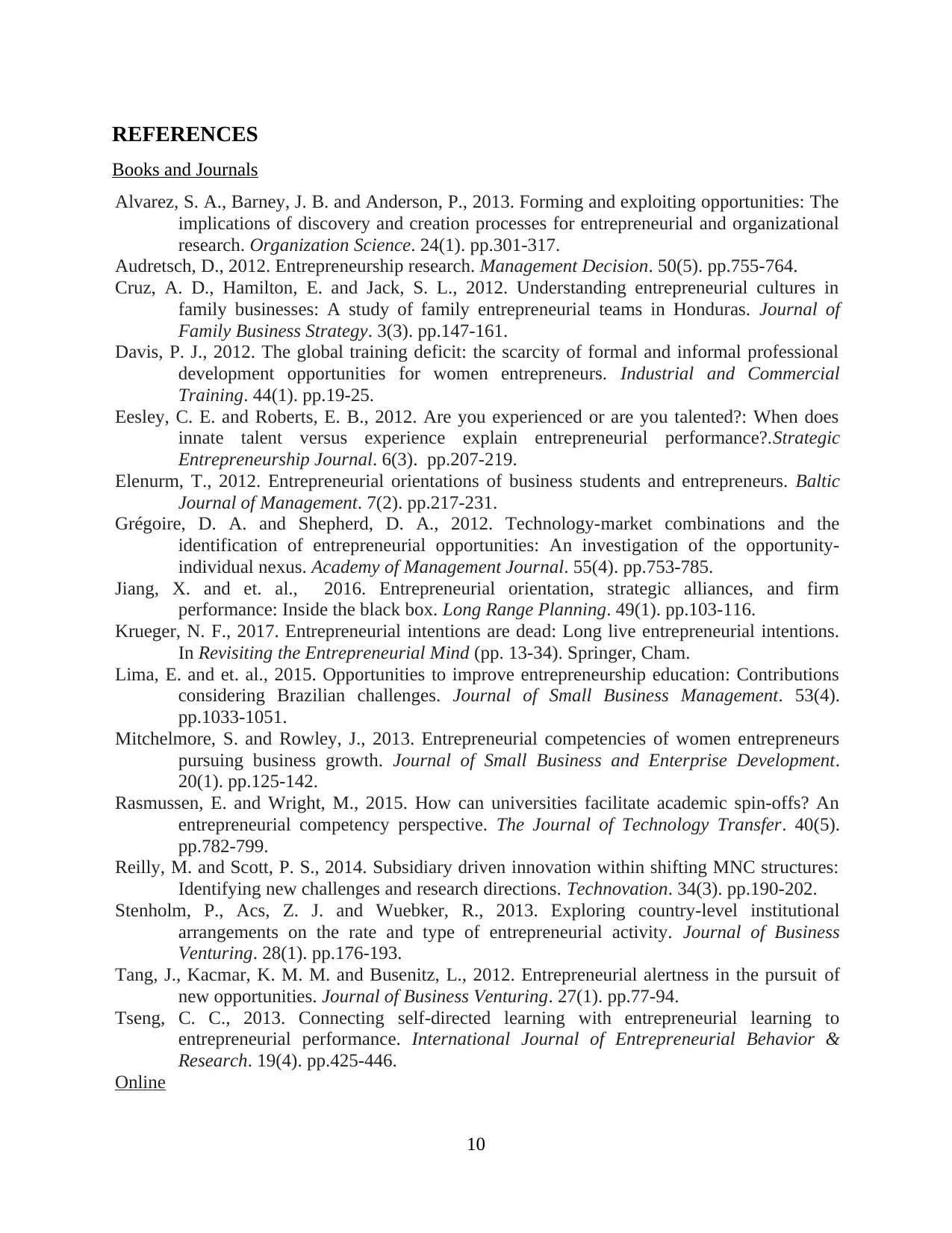
REFERENCES
Books and Journals
Alvarez, S. A., Barney, J. B. and Anderson, P., 2013. Forming and exploiting opportunities: The
implications of discovery and creation processes for entrepreneurial and organizational
research. Organization Science. 24(1). pp.301-317.
Audretsch, D., 2012. Entrepreneurship research. Management Decision. 50(5). pp.755-764.
Cruz, A. D., Hamilton, E. and Jack, S. L., 2012. Understanding entrepreneurial cultures in
family businesses: A study of family entrepreneurial teams in Honduras. Journal of
Family Business Strategy. 3(3). pp.147-161.
Davis, P. J., 2012. The global training deficit: the scarcity of formal and informal professional
development opportunities for women entrepreneurs. Industrial and Commercial
Training. 44(1). pp.19-25.
Eesley, C. E. and Roberts, E. B., 2012. Are you experienced or are you talented?: When does
innate talent versus experience explain entrepreneurial performance?.Strategic
Entrepreneurship Journal. 6(3). pp.207-219.
Elenurm, T., 2012. Entrepreneurial orientations of business students and entrepreneurs. Baltic
Journal of Management. 7(2). pp.217-231.
Grégoire, D. A. and Shepherd, D. A., 2012. Technology-market combinations and the
identification of entrepreneurial opportunities: An investigation of the opportunity-
individual nexus. Academy of Management Journal. 55(4). pp.753-785.
Jiang, X. and et. al., 2016. Entrepreneurial orientation, strategic alliances, and firm
performance: Inside the black box. Long Range Planning. 49(1). pp.103-116.
Krueger, N. F., 2017. Entrepreneurial intentions are dead: Long live entrepreneurial intentions.
In Revisiting the Entrepreneurial Mind (pp. 13-34). Springer, Cham.
Lima, E. and et. al., 2015. Opportunities to improve entrepreneurship education: Contributions
considering Brazilian challenges. Journal of Small Business Management. 53(4).
pp.1033-1051.
Mitchelmore, S. and Rowley, J., 2013. Entrepreneurial competencies of women entrepreneurs
pursuing business growth. Journal of Small Business and Enterprise Development.
20(1). pp.125-142.
Rasmussen, E. and Wright, M., 2015. How can universities facilitate academic spin-offs? An
entrepreneurial competency perspective. The Journal of Technology Transfer. 40(5).
pp.782-799.
Reilly, M. and Scott, P. S., 2014. Subsidiary driven innovation within shifting MNC structures:
Identifying new challenges and research directions. Technovation. 34(3). pp.190-202.
Stenholm, P., Acs, Z. J. and Wuebker, R., 2013. Exploring country-level institutional
arrangements on the rate and type of entrepreneurial activity. Journal of Business
Venturing. 28(1). pp.176-193.
Tang, J., Kacmar, K. M. M. and Busenitz, L., 2012. Entrepreneurial alertness in the pursuit of
new opportunities. Journal of Business Venturing. 27(1). pp.77-94.
Tseng, C. C., 2013. Connecting self-directed learning with entrepreneurial learning to
entrepreneurial performance. International Journal of Entrepreneurial Behavior &
Research. 19(4). pp.425-446.
Online
10
Books and Journals
Alvarez, S. A., Barney, J. B. and Anderson, P., 2013. Forming and exploiting opportunities: The
implications of discovery and creation processes for entrepreneurial and organizational
research. Organization Science. 24(1). pp.301-317.
Audretsch, D., 2012. Entrepreneurship research. Management Decision. 50(5). pp.755-764.
Cruz, A. D., Hamilton, E. and Jack, S. L., 2012. Understanding entrepreneurial cultures in
family businesses: A study of family entrepreneurial teams in Honduras. Journal of
Family Business Strategy. 3(3). pp.147-161.
Davis, P. J., 2012. The global training deficit: the scarcity of formal and informal professional
development opportunities for women entrepreneurs. Industrial and Commercial
Training. 44(1). pp.19-25.
Eesley, C. E. and Roberts, E. B., 2012. Are you experienced or are you talented?: When does
innate talent versus experience explain entrepreneurial performance?.Strategic
Entrepreneurship Journal. 6(3). pp.207-219.
Elenurm, T., 2012. Entrepreneurial orientations of business students and entrepreneurs. Baltic
Journal of Management. 7(2). pp.217-231.
Grégoire, D. A. and Shepherd, D. A., 2012. Technology-market combinations and the
identification of entrepreneurial opportunities: An investigation of the opportunity-
individual nexus. Academy of Management Journal. 55(4). pp.753-785.
Jiang, X. and et. al., 2016. Entrepreneurial orientation, strategic alliances, and firm
performance: Inside the black box. Long Range Planning. 49(1). pp.103-116.
Krueger, N. F., 2017. Entrepreneurial intentions are dead: Long live entrepreneurial intentions.
In Revisiting the Entrepreneurial Mind (pp. 13-34). Springer, Cham.
Lima, E. and et. al., 2015. Opportunities to improve entrepreneurship education: Contributions
considering Brazilian challenges. Journal of Small Business Management. 53(4).
pp.1033-1051.
Mitchelmore, S. and Rowley, J., 2013. Entrepreneurial competencies of women entrepreneurs
pursuing business growth. Journal of Small Business and Enterprise Development.
20(1). pp.125-142.
Rasmussen, E. and Wright, M., 2015. How can universities facilitate academic spin-offs? An
entrepreneurial competency perspective. The Journal of Technology Transfer. 40(5).
pp.782-799.
Reilly, M. and Scott, P. S., 2014. Subsidiary driven innovation within shifting MNC structures:
Identifying new challenges and research directions. Technovation. 34(3). pp.190-202.
Stenholm, P., Acs, Z. J. and Wuebker, R., 2013. Exploring country-level institutional
arrangements on the rate and type of entrepreneurial activity. Journal of Business
Venturing. 28(1). pp.176-193.
Tang, J., Kacmar, K. M. M. and Busenitz, L., 2012. Entrepreneurial alertness in the pursuit of
new opportunities. Journal of Business Venturing. 27(1). pp.77-94.
Tseng, C. C., 2013. Connecting self-directed learning with entrepreneurial learning to
entrepreneurial performance. International Journal of Entrepreneurial Behavior &
Research. 19(4). pp.425-446.
Online
10
⊘ This is a preview!⊘
Do you want full access?
Subscribe today to unlock all pages.

Trusted by 1+ million students worldwide
1 out of 13
Related Documents
Your All-in-One AI-Powered Toolkit for Academic Success.
+13062052269
info@desklib.com
Available 24*7 on WhatsApp / Email
![[object Object]](/_next/static/media/star-bottom.7253800d.svg)
Unlock your academic potential
Copyright © 2020–2026 A2Z Services. All Rights Reserved. Developed and managed by ZUCOL.




